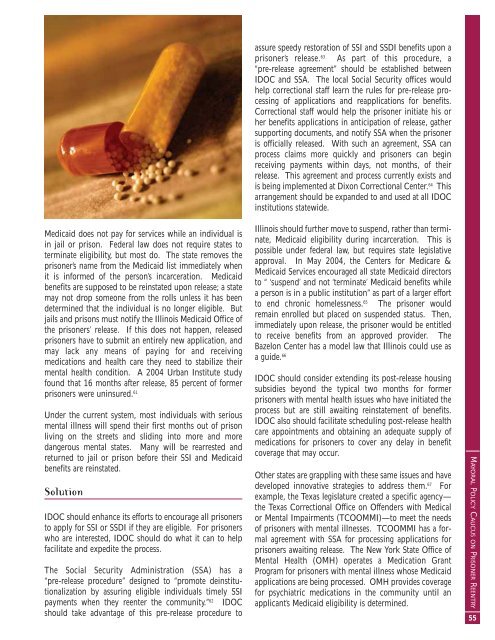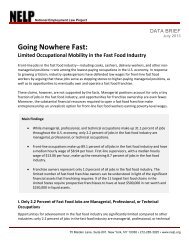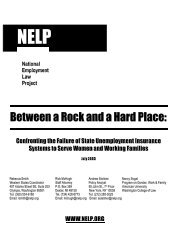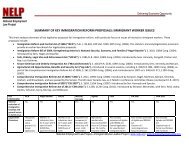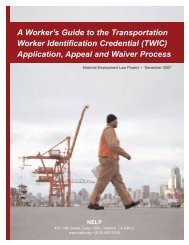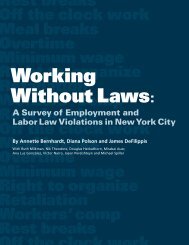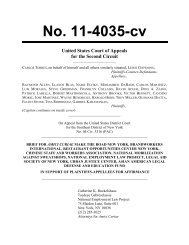Rebuilding Lives. Strengthening Communities.
Rebuilding Lives. Strengthening Communities.
Rebuilding Lives. Strengthening Communities.
You also want an ePaper? Increase the reach of your titles
YUMPU automatically turns print PDFs into web optimized ePapers that Google loves.
Medicaid does not pay for services while an individual is<br />
in jail or prison. Federal law does not require states to<br />
terminate eligibility, but most do. The state removes the<br />
prisoner’s name from the Medicaid list immediately when<br />
it is informed of the person’s incarceration. Medicaid<br />
benefits are supposed to be reinstated upon release; a state<br />
may not drop someone from the rolls unless it has been<br />
determined that the individual is no longer eligible. But<br />
jails and prisons must notify the Illinois Medicaid Office of<br />
the prisoners’ release. If this does not happen, released<br />
prisoners have to submit an entirely new application, and<br />
may lack any means of paying for and receiving<br />
medications and health care they need to stabilize their<br />
mental health condition. A 2004 Urban Institute study<br />
found that 16 months after release, 85 percent of former<br />
prisoners were uninsured. 61<br />
Under the current system, most individuals with serious<br />
mental illness will spend their first months out of prison<br />
living on the streets and sliding into more and more<br />
dangerous mental states. Many will be rearrested and<br />
returned to jail or prison before their SSI and Medicaid<br />
benefits are reinstated.<br />
Solution<br />
IDOC should enhance its efforts to encourage all prisoners<br />
to apply for SSI or SSDI if they are eligible. For prisoners<br />
who are interested, IDOC should do what it can to help<br />
facilitate and expedite the process.<br />
The Social Security Administration (SSA) has a<br />
“pre-release procedure” designed to “promote deinstitutionalization<br />
by assuring eligible individuals timely SSI<br />
payments when they reenter the community.” 62 IDOC<br />
should take advantage of this pre-release procedure to<br />
assure speedy restoration of SSI and SSDI benefits upon a<br />
prisoner’s release. 63 As part of this procedure, a<br />
“pre-release agreement” should be established between<br />
IDOC and SSA. The local Social Security offices would<br />
help correctional staff learn the rules for pre-release processing<br />
of applications and reapplications for benefits.<br />
Correctional staff would help the prisoner initiate his or<br />
her benefits applications in anticipation of release, gather<br />
supporting documents, and notify SSA when the prisoner<br />
is officially released. With such an agreement, SSA can<br />
process claims more quickly and prisoners can begin<br />
receiving payments within days, not months, of their<br />
release. This agreement and process currently exists and<br />
is being implemented at Dixon Correctional Center. 64 This<br />
arrangement should be expanded to and used at all IDOC<br />
institutions statewide.<br />
Illinois should further move to suspend, rather than terminate,<br />
Medicaid eligibility during incarceration. This is<br />
possible under federal law, but requires state legislative<br />
approval. In May 2004, the Centers for Medicare &<br />
Medicaid Services encouraged all state Medicaid directors<br />
to “ ‘suspend’ and not ‘terminate’ Medicaid benefits while<br />
a person is in a public institution” as part of a larger effort<br />
to end chronic homelessness. 65 The prisoner would<br />
remain enrolled but placed on suspended status. Then,<br />
immediately upon release, the prisoner would be entitled<br />
to receive benefits from an approved provider. The<br />
Bazelon Center has a model law that Illinois could use as<br />
a guide. 66<br />
IDOC should consider extending its post-release housing<br />
subsidies beyond the typical two months for former<br />
prisoners with mental health issues who have initiated the<br />
process but are still awaiting reinstatement of benefits.<br />
IDOC also should facilitate scheduling post-release health<br />
care appointments and obtaining an adequate supply of<br />
medications for prisoners to cover any delay in benefit<br />
coverage that may occur.<br />
Other states are grappling with these same issues and have<br />
developed innovative strategies to address them. 67 For<br />
example, the Texas legislature created a specific agency—<br />
the Texas Correctional Office on Offenders with Medical<br />
or Mental Impairments (TCOOMMI)—to meet the needs<br />
of prisoners with mental illnesses. TCOOMMI has a formal<br />
agreement with SSA for processing applications for<br />
prisoners awaiting release. The New York State Office of<br />
Mental Health (OMH) operates a Medication Grant<br />
Program for prisoners with mental illness whose Medicaid<br />
applications are being processed. OMH provides coverage<br />
for psychiatric medications in the community until an<br />
applicant’s Medicaid eligibility is determined.<br />
MAYORAL POLICY CAUCUS ON PRISONER REENTRY<br />
55


